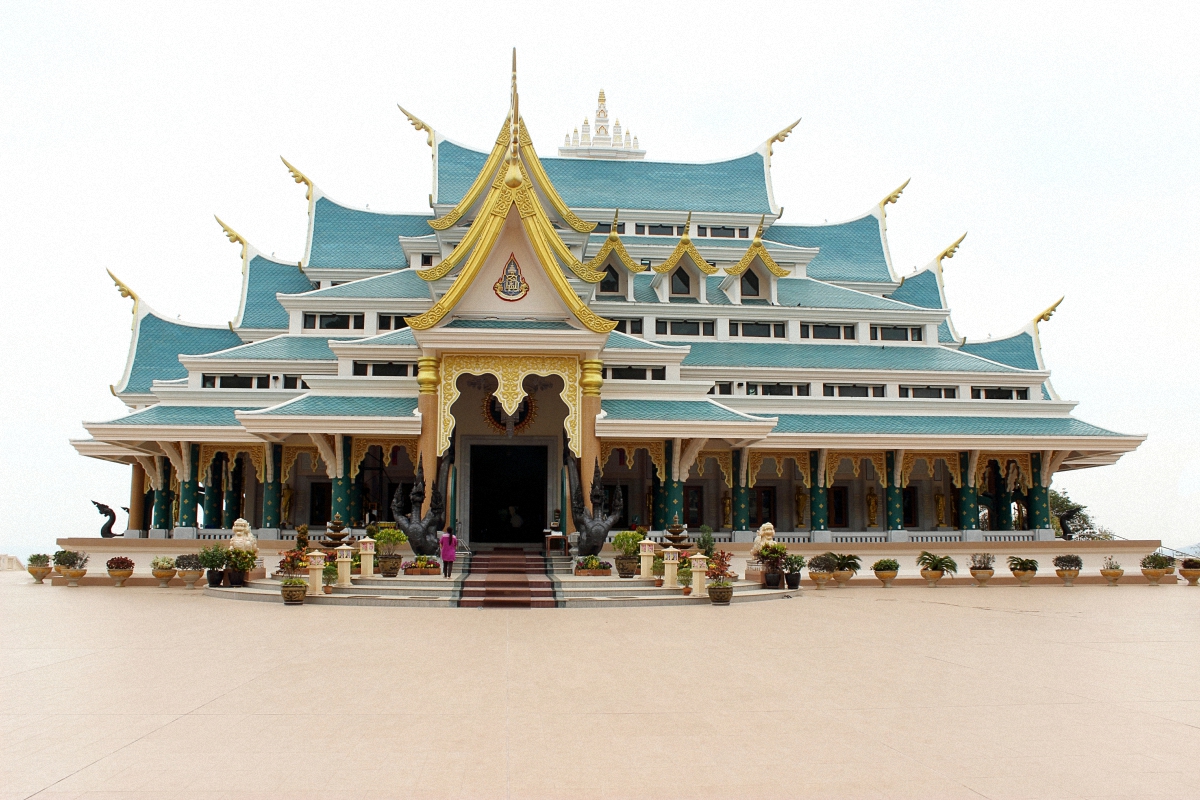Poland has recently provided a safe haven to a family of asylum-seekers from Thailand, persecuted on religious grounds in their country of origin, which in their testimony appears to be very different from the image of a paradisiac land for Western tourists. Their application is currently being examined by the Polish authorities.
Hadee Laepankaeo (51), his wife Sunee Satanga (45) and their daughter Nadia Satanga who are now in Poland are members of the Ahmadi Religion of Peace and Light. They were persecuted in Thailand because their beliefs are in conflict with the constitution but also with the local Shia community.
After being arrested and harshly treated in Turkey, the family decided to attempt to cross the border and seek refuge in Bulgaria. They were in the group of 104 members of the Ahmadi Religion of Light and Peace who were arrested at the border and beaten by the Turkish police before being detained for months in refugee camps in appalling conditions.
The Ahmadi Religion of Peace and Light is a new religious movement that finds its roots in Twelver Shia Islam. It was founded in 1999. It is headed by Abdullah Hashem Aba Al-Sadiq and follows the teachings of Imam Ahmed al-Hassan as its divine guide. It is not to be confused with the Ahmadiyya Community founded in the 19th century by Mirza Ghulam Ahmad within a Sunni context, with which it has no relations.
Alexandra Foreman, a British journalist who covered the issue of 104 members of the Ahmadi Religion of Peace and Light, investigated the roots of that religious persecution in Thailand. What follows is the result of her inquiry.
The conflict between the Thai constitution and the beliefs of the Ahmadi Religion of Peace and Light
Hadee and his family had to leave Thailand because it had become an increasingly dangerous place for believers in the Ahmadi Religion of Peace and Light. The country’s lese-majeste law, Article 112 of the criminal code, stands as one of the world’s strictest statutes against insulting the monarchy. This law has been implemented with increasing rigour since the military’s assumption of power in 2014, leading to harsh jail sentences for numerous individuals.
The Ahmadi Religion of Peace and Light teaches that only God can appoint the ruler, which has led to many Thai believers being targeted and arrested under Lese-majeste.
Furthermore chapter 2, section 7 of the constitution of Thailand designates the King as a Buddhist and calls him the “Upholder of religions”.
Members of the Ahmadi Religion of Peace and Light encounter a fundamental conflict due to their belief system, as their religious doctrine maintains that the upholder of religion is their spiritual leader, Aba Al-Sadiq Abdullah Hashem, thereby creating an ideological incongruence with the designated role of the King within the state’s framework.
Additionally under chapter 2, section 6 of the constitution of Thailand “The King shall be enthroned in a position of revered worship”. Adherents of the Ahmadi Religion of Peace and Light are unable to offer worship to the King of Thailand due to their fundamental belief that only God and His divinely appointed vicegerent are deserving of such reverence. Consequently, they deem the assertion of the King’s entitlement to worship as illegitimate and incompatible with their religious doctrine.

Even though the Ahmadi Religion of Peace and Light is an officially registered religion in the United States and Europe – it is however not an official religion in Thailand and is therefore not protected. The law of Thailand officially recognizes only five religious groups: Buddhists, Muslims, Brahmin-Hindus, Sikhs, and Christians, and in practice the government as a matter of policy will not recognize any new religious groups outside the five umbrella groups. To receive such a status the Ahmadi Religion of Peace and Light would need to get permission from the other five recognised religions. This is however impossible as Muslim groups consider this religion heretical, due to some it’s beliefs such as the abrogation of the five daily prayers, the Kaaba being in Petra (Jordan) and not Mecca, and that the Qur’an has corruptions.
Hadee Laepankaeo, personally persecuted on the grounds of lèse-majesté
Hadee Laepankaeo, who has been a believer in the Ahmadi Religion of Peace and Light for six years, was previously an active political activist as part of the United Front of Democracy Against Dictatorship, commonly known as the “red shirt” group, advocating against the authority of the Thai monarchy. When Hadee embraced the Ahmadi Religion of Peace and Light, Thai religious scholars associated with the government found it a prime opportunity to frame him under the lese-majeste laws and instigate the government against him. The situation became increasingly dangerous when the believers found themselves targeted by death threats from Shia followers associated with Sayyid Sulaiman Husaini who believed they could act with impunity, without fear of legal repercussions.
Tensions heightened significantly after the release in December 2022 of “the Goal of the Wise,” the Gospel of the Ahmadi Religion of Peace and Light. This text, critical of the Iranian clergy’s rule and its absolute power, triggered a global wave of persecution against members of the Ahmadi Religion of Peace and Light. In Thailand, scholars with ties to the Iranian regime felt threatened by the scripture’s content and began lobbying the Thai government against the Ahmadi Religion of Peace and Light. They sought to implicate Hadee and fellow believers with lèse-majesté charges under Article 112 of the Thai Criminal Code.
In December, Hadee delivered speeches on Paltalk in Thai, discussing “The Goal of the Wise ” and advocating for the belief that the only legitimate ruler is one appointed by God.
On December 30, 2022, Hadee faced a troubling encounter when a secret government unit arrived at his residence. Forced outside, Hadee was physically assaulted, resulting in injuries including the loss of a tooth. Accused of lèse-majesté, he received threats of violence and was warned against further disseminating his religious beliefs.
Subsequently, he was detained for two days in an undisclosed location resembling a safe house, enduring daily mistreatment. Fearing further persecution, Hadee refrained from seeking medical assistance for his injuries, fearing reprisals from authorities who already deemed him a threat to the monarchy. Concerns for his family’s safety led Hadee, his wife, and their daughter, Nadia, to flee Thailand for Turkey on January 23, 2023, seeking refuge among like-minded believers.
Incitement to hate and to kill by a Shia scholar
The Thai members of the Ahmadi Religion have also faced a campaign of persecution from religious groups that are very influential in Thailand, with strong ties to the government and the King especially.
Many fundamentalist Muslims are led by prominent Shia scholar Sayid Sulaiman Huseyni who delivered a series of directives aimed at inciting violence against members of the Ahmadi Religion of Peace and Light. “If you encounter them, hit them with a wooden stick,” he said and asserted that “The Ahmadi Religion of Peace and Light is the enemy of the religion. It is forbidden to do any religious activities together. Do not do any activities with them, such as sitting and laughing or eating together, or else you will share the sins of this misguidance too.” Sayid Sulaiman Huseyni ended the sermon by making a prayer that if members of the Ahmadi religion do not repent and leave the religion, then God should “eliminate them all.”
No safe future for the Ahmadi Religion of Peace and Light in Thailand
The government persecution against members of the Ahmadi Religion of Peace and Light climaxed when 13 of their members were arrested during a peaceful march in Had Yai, Songkhla Province, South Thailand on May 14th, 2023. Their members were then decrying the strict lèse-majesté laws and the lack of freedom to proclaim their faith in Thailand. During interrogation they were told that they are prohibited from ever publicly proclaiming or manifesting their beliefs again.
Since his departure, Hadee’s siblings remaining in Thailand have faced harassment from the secret police, subjected to questioning about his whereabouts. This pressure prompted them to sever contact with Hadee out of fear of further harassment by Thai authorities.
TETEXCLUSIVE






